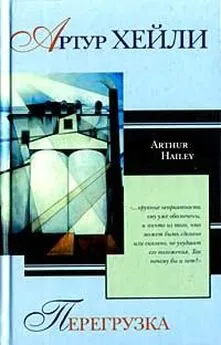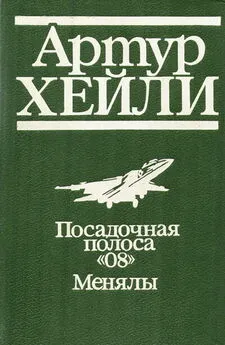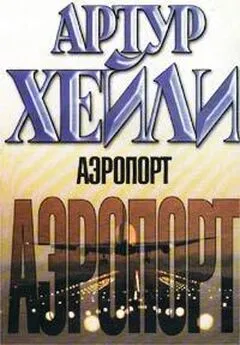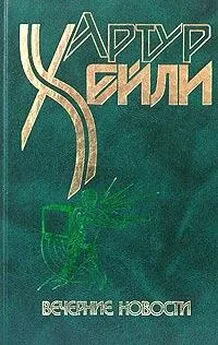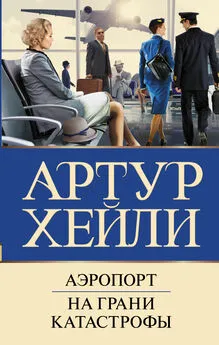Артур Хейли - Аэропорт / Аirport
- Название:Аэропорт / Аirport
- Автор:
- Жанр:
- Издательство:неизвестно
- Год:2020
- Город:Москва
- ISBN:978-5-17-121013-7
- Рейтинг:
- Избранное:Добавить в избранное
-
Отзывы:
-
Ваша оценка:
Артур Хейли - Аэропорт / Аirport краткое содержание
Для удобства читателя текст сопровождается комментариями и кратким словарем.
Предназначается для продолжающих изучать английский язык (уровень 4 – Upper-Intermediate).
Аэропорт / Аirport - читать онлайн бесплатно ознакомительный отрывок
Интервал:
Закладка:
“First, mister, there’s spilled gasoline around here. You’d better get that cigar out.”
Patroni ignored the instruction, as he ignored almost all smoking regulations. He waved the cigar toward the overturned tractor-trailer. “What’s more, son, you’d be wasting everybody’s time, including mine and yours, trying to get that hunk of junk right side up tonight. You’ll have to drag it clear so traffic can move, and to do that you need two more tow trucks.” He began moving around, using his electric lantern to inspect the big vehicle from various angles. As always, when considering a problem, he was totally absorbed.
Ten minutes later, working with the police officers, Joe Patroni had virtually taken charge. Helping to clear the blocked highway, he calculated, was the fastest means of getting there.
5
As Mel drove out of the terminal, wind and whirling snow slammed savagely against the car’s windshield.
Mel snapped his mike button down. “Ground control from mobile one. I’m at gate sixty-five, proceeding to runway three zero, site of the stuck 707.”
It took a quarter of an hour to reach the intersection where runway three zero was blocked by the Aéreo-Mexican 707. He stopped the car and got out.
Mel identified himself, then asked a man nearby, “Who are you?”
“Ingram, sir. Aéreo-Mexican maintenance foreman.”
In the past two hours, old-fashioned boarding ramps had been trundled from the terminal and passengers guided down them. The captain and first officer remained.
“Had the engines running twice. But she won’t come free. Just seems to dig herself in deeper. Now we’re taking off more weight, hoping that’ll help.”
Mel shivered. What was it? It was true, wasn’t it?—for the briefest instant he had had a premonition. He should ignore it, of course. Except that once, long ago, he had had the same feeling…
Back in his car Mel held the transmit button down. “This is mobile one, Danny. I’m going to the Conga Line.”
The Conga Line, prime mover of the airport snow-fighting system, was on runway one seven, left. In a few minutes, Mel thought grimly, he would find out for himself if there was truth, or merely malice, in the critical report of Captain Demerest’s Airlines Snow Committee.
6
Captain Vernon Demerest of Trans America had had a succession of affairs with beautiful and intelligent young women. One of them was a vivacious, attractive, English-born brunette, Gwen Meighen, to whose apartment Vernon Demerest was headed now. Later tonight, the two of them would leave for Rome on Trans America Flight Two. At the Rome end of the journey, there would be a three-day layover for the crew, which they could spend together. The idea excited him.
Another thing which had pleased him this evening was the Airlines Snow Committee report. The critical report had been solely Demerest’s idea. He made certain that the widely circulated report would cause a maximum of embarrassment and irritation to Mel Bakersfeld.
Captain Demerest stopped the car smoothly and got out. He was a little early.
Today’s flight to Rome would be an easy one. The reason was that he was flying as a line check captain. Anson Harris, almost as senior as Demerest himself, had been assigned to the flight and would occupy the command pilot’s left seat. Demerest would use the right seat—normally the first officer’s position—from where he would observe and report on Captain Harris’s performance.
Despite the fact that captains checked each other, the tests, both regular and special, were usually serious, exacting sessions. The pilots wanted them that way. Too much was at stake—public safety and high professional standards—for any mutual back-scratching, or for weaknesses to be overlooked.
Yet, Demerest treated any pilot he was assigned to test, junior or senior to himself, in precisely the same way—like a schoolboy summoned to the headmaster’s presence. When Demerest’s own time came they would give him the meanest, toughest check ride he had ever had, but Vernon Demerest turned in a flawless performance which could not be faulted.
This afternoon Demerest prefaced his check session by telephoning Captain Anson Harris at home. “It’ll be a bad night for driving. I like my crew to be punctual, so I suggest you allow plenty of time to get to the airport.”
Anson Harris, who in twenty-two unblemished years with Trans America had never been late for a single flight, was so outraged, he almost choked.
He arrived at the airport almost three hours ahead of flight time instead of the usual one hour.
“Hi, Anson.” Vernon Demerest dropped into an adjoining seat at the counter. “I see you took my good advice.”
“Good evening, Vern.”
“We’ll start the pre-flight briefing twenty minutes earlier than usual,” Demerest said. “I want to check your flight manuals.”
Thank God, Harris thought, his wife had gone through his manuals only yesterday, inserting the very latest amendments.
“You’re not wearing a regulation shirt.”
For a moment, Captain Harris could not believe his colleague was serious. Most pilots bought the unofficial shirts and wore them. Vernon Demerest did too .
“It’s all right. I won’t report on your wearing a non-reg shirt here. As long as you change it before you come on my flight.”
All right , he would change his unofficial shirt for a regulation one. He would probably have to borrow one. When he told them why, they would hardly believe him.
Demerest’s thoughts returned to the present.
Gwen was in the shower. When he went to her bedroom door, she called out, “Vernon, is that you?” Even competing with the shower, her voice—with its flawless English accent, which he liked so much—sounded exciting.
“I’m glad you came early,” she called again. “I want to have a talk. You can make tea, if you like.”
7
Inside his car, Mel Bakersfeld shivered. Was the shivering the reminder from the old injury of his foot?
The injury had happened sixteen years ago off the coast of Korea when Mel had been a Navy pilot flying fighter missions from the carrier Essex . He had a kind of instinct… In a dogfight with a MIG-15, Mel’s Navy F9F-5 had been shot down into the sea.
He managed a controlled ditching, but his left foot was trapped by a jammed rudder pedal. Somehow, underwater, his foot came free. In intense pain, half-drowned, he surfaced. Later he learned he had severed the ligaments in front of his ankle, so that the foot extended from his leg in an almost straight line.
He had the same kind of instinct now.
Mel was nearing runway one seven, left. Without ceasing, since the storm began, the miles of runways had been plowed, vacuumed, brushed, and sanded by a group called a Conga Line. He saw it now.
His arrival was noticed. He heard the convoy leader notified by radio, “Mr. Bakersfeld just joined us.” He had come out to inspect the snow clearance as a result of the adverse report by Vernon Demerest’s Airlines Snow Committee. Clearly, everything was going well.
8
Less than five years ago, the airport was considered among the world’s finest and most modern. Now travelers and visitors at Lincoln International saw principally the main passenger terminal—a brightly lighted, air-conditioned Taj Mahal and still admired it. Where the deficiencies lay were in operating areas – runways and taxiways. They were dangerously over-taxed. Only last week Keith Bakersfeld, Mel’s brother, had predicted grimly, “Someday there’ll be a second’s inattention, and one of us will bring two airplanes together at that intersection.”
Mel had pointed out the hazard frequently to the Board of Airport Commissioners and to members of City Council, who controlled airport financing. As well as immediate construction of more runways and taxiways, Mel had urged purchase of additional land around the airport for long term development. There had been plenty of discussion, and sometimes angry argument, as a result.
As well as the airport’s future, Mel’s personal future was at stake.
Only a short time ago, Mel Bakersfeld had been a national spokesman for ground logistics of aviation, a rising young genius in aviation management. Then, abruptly, a single event had wrought a change, and the future was no longer clear.
That event was the John F. Kennedy assassination.
It had been four years ago. Four years since the gray November afternoon when, he had pulled the microphone across his desk toward him and had announced the shattering news which seconds earlier had flashed from Dallas.
His eyes, as he spoke then, had been on the photograph whose inscription read: To my friend Mel Bakersfeld—John F. Kennedy.
The photograph still remained, as did many memories.
The memories began, for Mel, with his speech in Washington, D.C.
At the time, as well as airport general manager, he had been president of the Airport Operators Council – the youngest leader, ever, of that small but influential body linking major airports of the world. AOC headquarters was in Washington, and Mel flew there frequently.
His speech was to a national planning congress.
Aviation, Mel Bakersfeld had pointed out, was the only truly successful international undertaking. It was a means of intermingling diverse populations at ever-diminishing cost. Even more significant was aerial commerce. Movement of freight by air, already mammoth in extent, was destined to be greater still. Yet, airports, runway systems, terminals, were geared to yesterday, with scant—if any—provision for tomorrow; what was lost sight of, or ignored, was the speed of aviation’s progress. Usually, too much was spent on showplace terminals, too little on operating areas.
“We have broken the sound barrier,” Mel declared, “but not the ground barrier.”
The speech was accorded a standing ovation and was widely reported.
The day after the speech, Mel was invited to the White House. J.F.K., Mel found, shared many of his own ideas.
Subsequently, there were other sessions. After several such occasions, Mel was at home in the White House. As time went on, he drifted into one of those easygoing relationships which J.F.K. encouraged among those with expertise to offer him.
Soon Mel was “in”—a dues-paid member of the inner circle. His prestige, high before, went higher still. The Airport Operators Council re-elected him president, barely in his late thirties.
Six months later, John F. Kennedy made his fateful Texas journey.
Like others, Mel was first stunned, then later wept. Only later still, did it dawn on him that the assassin’s bullets had ricocheted onto the lives of others, his own among them. He discovered he was no longer “in” in Washington.
Mel’s trips to Washington ceased. His public appearances became limited to local ones. Even though there was plenty to think about, including troubles at home, there was a sense that time and opportunity had passed him by.
Mel eased his car into the terminal basement parking area.
Near his parking stall was a locked box with an airport telephone. He dialed the Snow Desk and asked about the jet, but there was no news.
Mel hesitated. There was no reason, he supposed, why he need remain at the airport any longer tonight. Yet again, unaccountably, he had the same premonition.
Mel dialed another number and asked for Cindy. After a brief wait, he heard her voice say sharply, “Mel, why aren’t you here?”
“I’m sorry. It’s a pretty big storm…”
Читать дальшеИнтервал:
Закладка:




